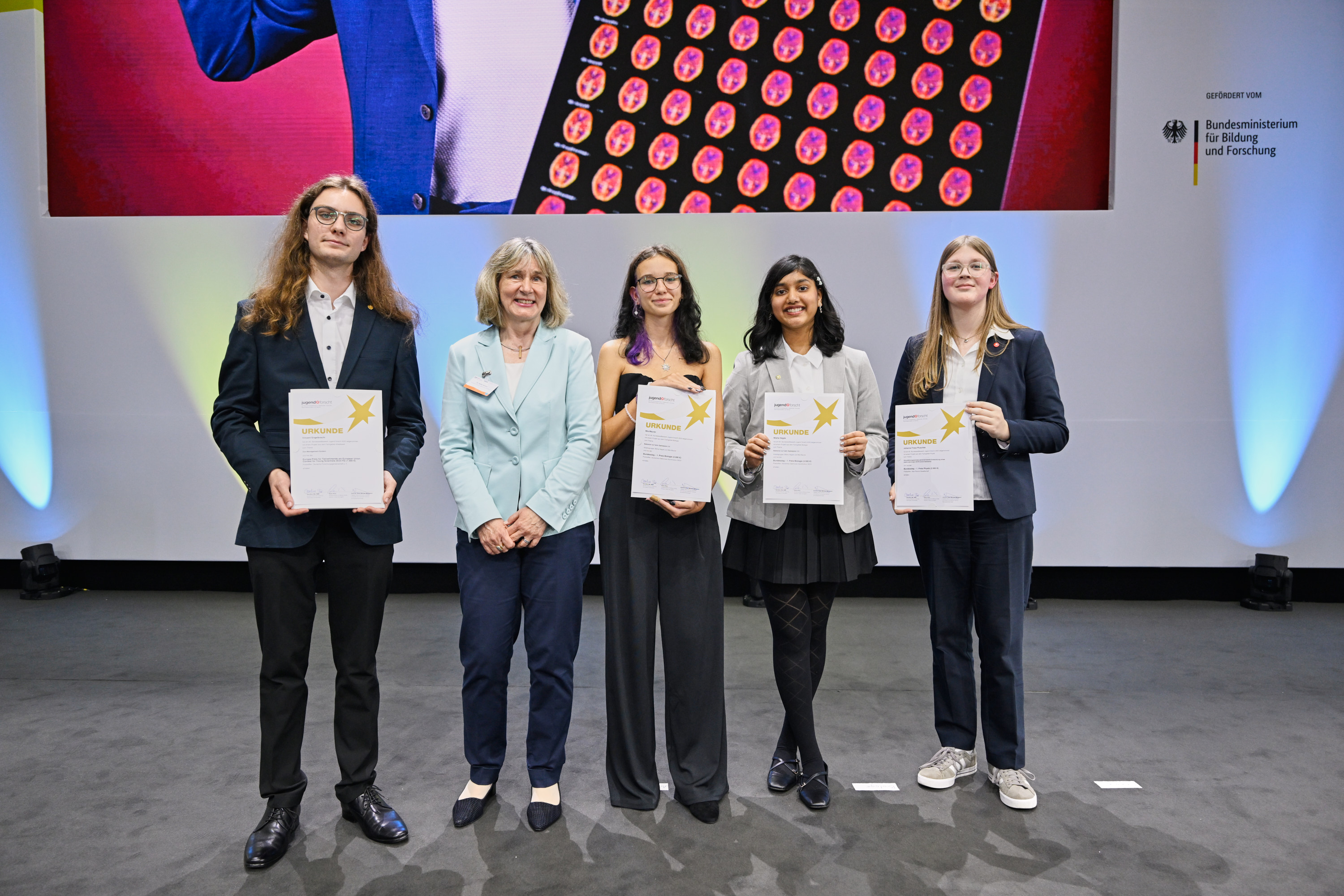Europa-Preis: DFG Presents Awards to Selected Jugend forscht Winners
Mentoring award prepares two individual researchers and a team of two for the European competition round in Riga/Latvia

Group picture of the Europa Prize Winners 2025

The General Secretary of the DFG, Dr. Heide Ahrens (2.l.) awarded the Europa Prize to „Jugend forscht“ in Hamburg to Vincent Engelbrecht, the team consisting of Mia Maurer and Misha Hegde as well as Johanna Freya Pluschke (l.to r.)
© Stiftung Jugend forscht e. V.
The General Secretary of the DFG, Dr. Heide Ahrens (2.l.) awarded the Europa Prize to „Jugend forscht“ in Hamburg to Vincent Engelbrecht, the team consisting of Mia Maurer and Misha Hegde as well as Johanna Freya Pluschke (l.to r.)
© Stiftung Jugend forscht e. V.
The Deutsche Forschungsgemeinschaft (DFG, German Research Foundation) has awarded its Europa-Preis (Europe prize) to four winners of the national Jugend forscht competition. The DFG’s aim in awarding the prize is to highlight the importance of international cooperation and networking for a successful career in research. DFG Secretary General Dr Heide Ahrens presented the award on 1 June at the Jugend forscht final in Hamburg, which was also attended by Federal President Frank-Walter Steinmeier and Federal Research Minister Dorothee Bär. The purpose of the DFG Europa-Preis is to support the four young researchers as they prepare for the European Union Contest for
Young Scientists (EUCYS), which is to be held in September in Riga, Latvia. They receive prize money of €1,000 per project.
Mentors provide subject-specific support for the Jugend forscht winners in their preparations for the European competition. The DFG selects these mentors from among the researchers in early career phases who are in receipt of DFG funding, for example under the Emmy Noether Programme. Another aim here is to promote lasting links among the different generations of researchers.
The recipients of the Europa-Preis are:
Vincent Engelbrecht (19) from Bavaria, national winner in the category “World of Work”. He developed a management system that allows all key processes involved in the administration of a zoo to be displayed and controlled in a single app – including the management of animal-related data, staff scheduling, resource management, climate control of enclosures and the generation of revenue and visitor statistics. The software developed by Vincent Engelbrecht enables zoo operators to monitor operations efficiently, ensure compliance with legal requirements, manage finances and optimise workflows, thereby reducing the administrative workload and not least improving the animals’ quality of life. The system has already been successfully implemented at Kleinzoo Wasserstern in Ingolstadt.
In the field of biology, the team from Hesse – consisting of Misha Hegde (15) and Mia Maurer (15) – impressed the jury with their project on bacteriophages – viruses that infect only bacteria. They aimed to demonstrate that this type of virus can combat bacterial pathogens in living plants. In order to do this, they isolated phages from soil samples, purified and propagated them, and investigated the environmental conditions under which they replicate most effectively. After sequencing the phage genome, they were able to show that their bacteriophage is a newly identified phage that belongs to the Podoviridae group. In future experiments, they plan to test whether phages from garden soil could be used as a form of biological pest control. Approaches of this kind could help reduce the use of antibiotics in plant production in the long term.
Johanna Freya Pluschke (18) from Lower Saxony won in the field of physics. She investigated a new approach to electric propulsion in space travel. Just like cars, spacecraft can also be powered electrically, using what are known as ion thrusters. These are engines which are powerful enough to efficiently position satellites in space and gently propel space probes. In her research project, Johanna Freya Pluschke focused on a specific type of ion thruster known for its durability. To develop her concept, she programmed a complex computer simulation capable of running on supercomputers. Her software models several core processes of an ion thruster, including the way the propellant gas is ionised – i.e. electrically charged – in order to generate thrust.
Further Information
Further information on the 2025 prizewinners will soon be available on the DFG’s Europa-Preis web page: www.dfg.de/europa-priz(interner Link)
For details of this year’s Jugend forscht winners, see: www.jugend-forscht.d(externer Link) (in German only)
Media contact
| E-mail: | presse@dfg.de |
| Telephone: | +49 228 885-2109 |